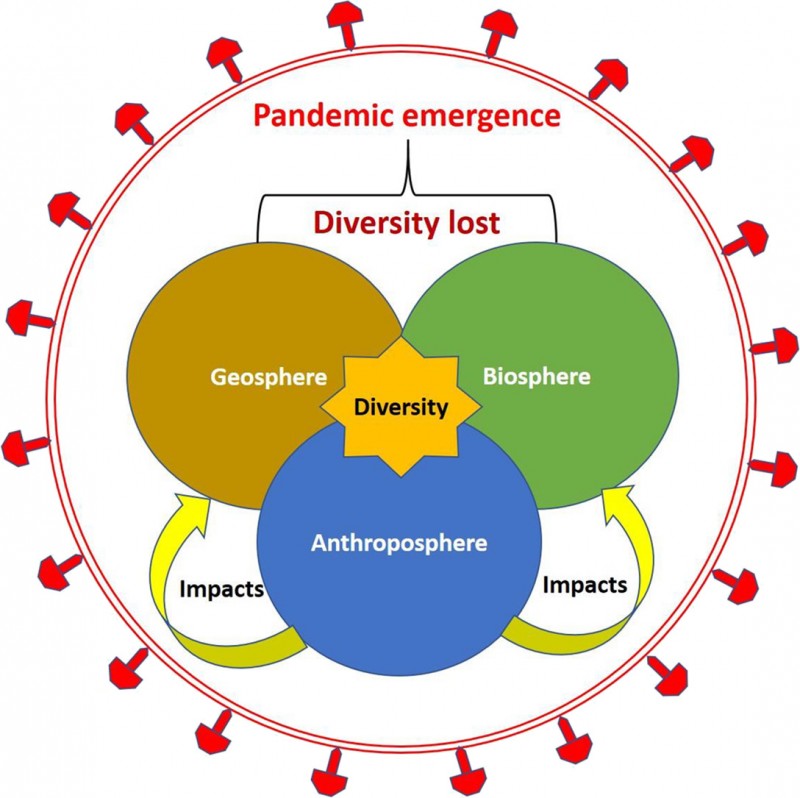News Details
Press Release: COVID-19 and other pandemics are the effects of our negative impact on the diversity of the total environment
Loss of diversity in biological, anthropological and geological global spheres enhances the emergence of zoonoses, according to KLI scientists
There is increasing awareness that the COVID-19 pandemic is the consequence of environmental and societal crises. A new paper just published in the scientific journal Science of the Total Environment (Cazzolla Gatti R. et al. Diversity lost: COVID-19 as a phenomenon of the total environment. Science of The Total Environment, 144014 https://doi.org/10.1016/j.scitotenv.2020.144014) by international research fellows of the Konrad Lorenz Institute for Evolution and Cognition Research (KLI), an Austrian independent center for advanced studies in the life and sustainability sciences, presents an interdisciplinary approach to analyze the COVID-19 pandemic as a phenomenon affecting the diversity of all spheres of the total environment.
KLI scientists made use of their multidisciplinary framework as an analytical tool to understand the relationships between diversity and the COVID-19 pandemic. “We propose to look at the COVID-19 pandemic – said Dr. Roberto Cazzolla Gatti, the leading author of the paper – as the result of our species’ negative impacts on the diversity of the Geosphere and Biosphere that may also have effects on the diversity of the Anthroposphere”.
If we want to learn how to deal with the COVID-19 pandemic – suggests the paper –, we have to embrace the complexity of this global phenomenon and capture interdependencies across scales and contexts. Yet, we still lack systematic approaches that we can use to deal holistically with the pandemic and its effects. The KLI team of biologists, anthropologists, philosophers of science, environmental economists and geographers, introduced a framework that highlights the systemic nature of the COVID-19 pandemic as a self-regulating and evolving system comprising three spheres, the Geosphere, the Biosphere, and the Anthroposphere.

Then, they used this framework to explore and organize information from the rapidly growing number of scientific papers, preprints, preliminary scientific reports, and journalistic pieces that give insights into the pandemic crisis. With this work, the authors of the paper point out that the pandemic should be understood as an emergent phenomenon resulting from social and environmental preconditions that led to depletion of human, biological, and geochemical diversity, as well as of feedback that differentially impacted the three spheres.
Focusing on the importance of interconnections within and across the spheres, the discussion paper presents several key messages on the overlapping implications of the pandemic and human activities on the Anthroposphere, Biosphere, and Geosphere.Human pressures on diversity in all spheres have created the preconditions for the emergence of the pandemic and set the stage for its drastic effects. The depletion of geochemical, biological, and human diversity has resulted in an accumulation of destructive actions impacting human activities and global governance strategies, as well as entire species and ecosystems. Finally, the immediate impacts of the pandemic on the diversity of the Anthroposphere – due to large scale quarantine regimes – may appear auspicious in the short term for the regeneration of the diversity of the Biosphere and Geosphere, but they have negative consequences in the long term.
KLI researchers contend that protecting and promoting diversity is necessary to contribute to more effective decision-making processes and policy interventions to face the current and future pandemics. “Diversity – said Dr. Guido Caniglia, KLI scientific director and senior author of the paper – may, indeed, represent the main solution to deal with pandemics and their effects”.
The paper’s authors conclude that “The COVID-19 pandemic clearly shows that global rehabilitation policies must be launched immediately to reinforce health security by restoring the complexity and diversity of ecological, social and economic systems to make them more resilient. In order to reorient the future, strategic alliances between environmental justice and social justice movements are needed. It is, therefore, fundamental that as scientists we join our forces with civil society’s protests in defending the rights of human diversity and that civil society joins scientists in the struggle for the conservation of biological and geological diversity. It is imperative for us as human beings to understand that diversity represents the invaluable resource of that universal exception that we call Life.”
Original paper:
Cazzolla Gatti R., Menéndez L. P., Laciny A., Bobadilla Rodríguez H., Bravo Morante G., Carmen E., Dorninger C., Fabris F., Grunstra N.D.S., Schnorr S. L., Stuhlträger J., Luis Villanueva Hernandez A., Jakab M., Sarto-Jackson I., Caniglia G., 2020. Diversity lost: COVID-19 as a phenomenon of the total environment. Science of The Total Environment, 144014 https://doi.org/10.1016/j.scitotenv.2020.144014

